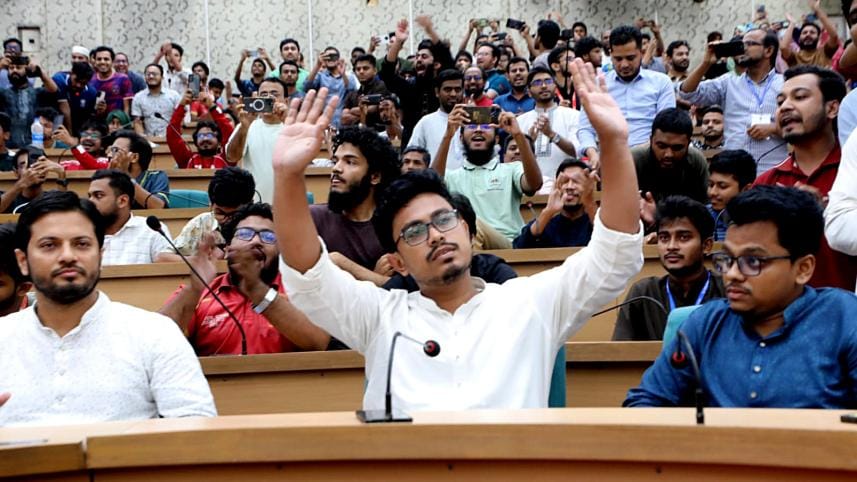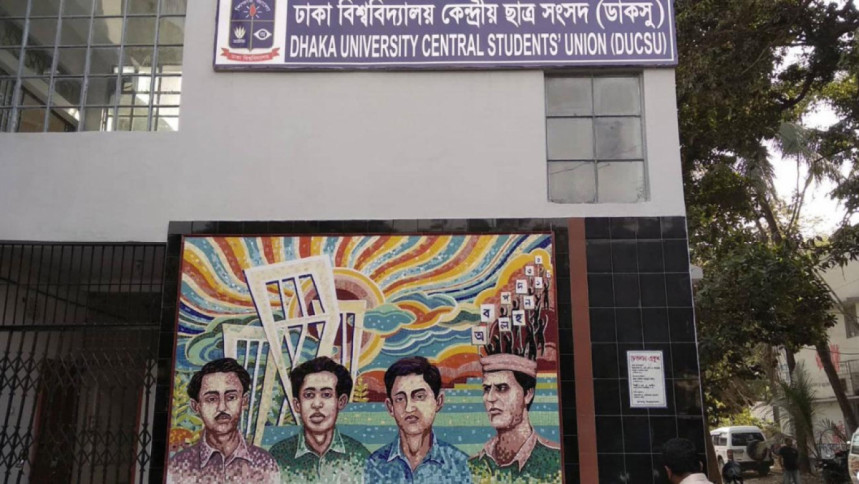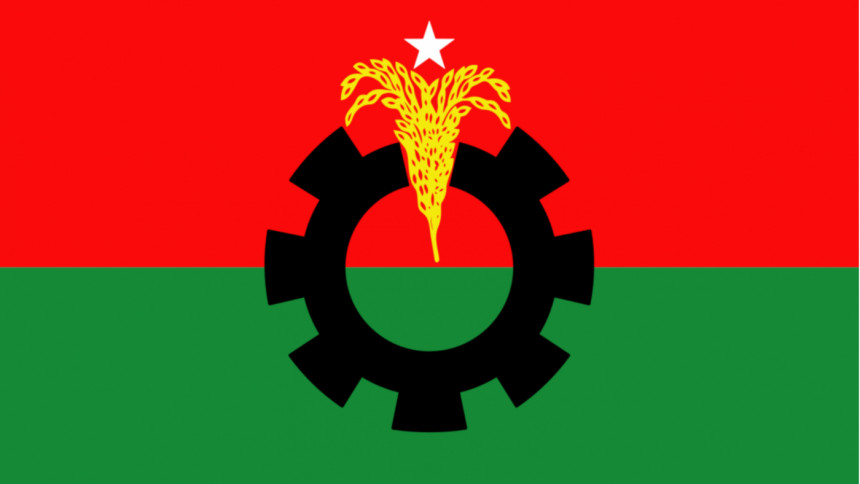Ducsu election: Identity, strategy, and the politics

The positive aspect of the just-concluded Dhaka University Central Students' Union (Ducsu) election is that it was held peacefully. No political violence occurred even after the results were announced, which was quite shocking for many. For this, the university authorities, the interim government, students, and political parties all deserve appreciation. However, concerns remain as to whether such peace can be maintained in the national election or the union elections at other universities.
The voter turnout was high overall. However, female student participation was about 15 percent lower than that of male students. If no special initiative is taken, it would probably not be wrong to assume that the women's turnout will also be low in the national election.
The flaws observed in election management also deserve attention. Various videos and candidates' complaints show that if the ballot marks were not dark enough, the scanners could not detect them, causing problems in counting. The attempt to introduce a technology-based counting system is good, but why couldn't the authorities of the country's top university solve this problem beforehand? It ended up resembling the Election Commission's past experiment with electronic voting machines (EVMs). In Britain, even when voting is done with a pencil, no such counting problems have been reported. There were also complaints about ballot distribution during the Ducsu polls. Allegations of distributing pre-marked ballots are absolutely unacceptable. It is unfortunate that those who worked at the polling centres lacked proper training. If a returning officer accuses a candidate of violating the code of conduct without even reading it, that must be considered inexcusable irresponsibility.
Those who won the election have set a new precedent. There is much to learn from their success. Hopefully, the outcome will encourage a culture of free thought, tolerance of differing views, and respect for dissent in the university, thereby playing a necessary role in establishing and safeguarding democracy. Ducsu's experience will also help in maintaining restraint in the face of criticism or condemnation, and in avoiding provocations. Even the refusal to respond to late-night rumours about government efforts to alter results through compromise is a good sign.
In analysing the results, some have said that students have rejected the binary politics of pro- and anti-independence. That may be true, or it may not. Although the media reported that the winners were from Islami Chhatrashibir, why did they not contest under that identity, as Jatiotabadi Chatradal (BNP's student wing) did? Instead, they contested under the banner of Oikyaboddho Shikkharthi Jote, which even included candidates who were not previously associated with Shibir. What is the explanation for not contesting under their real identity in an election held in a free environment after the fall of dictatorship? Can it be denied that they avoided their original identity because of Shibir and its parent organisation Jamaat-e-Islami's negative image of rejecting the Liberation War?
The question remains whether Shibir gained any special advantage by not contesting under their real identity. While Chatradal has a frightening image of hall takeovers and extortion, Shibir's record of hiding within Chhatra League and enjoying impunity for all kinds of wrongdoing has not been widely discussed. They have faced little accountability. A newspaper editor explained this well, "A Shibir member remains Shibir even if he joins Chhatra League, but a Chhatradal member becomes Chhatra League if he joins them." That's why Shibir has now been able to re-emerge openly. Another journalist critical of current political changes even congratulated Sheikh Hasina for Shibir's success, arguing that it was her patronage or indulgence that allowed them to organise so effectively underground.
In analysing the results, some have said that students have rejected the binary politics of pro- and anti-independence. That may be true, or it may not. Although the media reported that the winners were from Islami Chhatrashibir, why did they not contest under that identity, as Jatiotabadi Chatradal (BNP's student wing) did? Instead, they contested under the banner of Oikyaboddho Shikkharthi Jote, which even included candidates who were not previously associated with Shibir.
Another form of Shibir's disguise was posing as "general students" opposing student politics. In contrast, Chatradal was expelled from the campus for more than 15 years, faced exile, endured beatings and imprisonment, or had to flee for survival. They could not continue their organisational activities. But Shibir kept working either under the banner of general students, or joining Chhatra League and steadily organising themselves. Of course, posing as general students carried greater risks. One cannot forget the brutal killings of Abrar Fahad at Buet and Abu Bakar at Dhaka University, both on suspicion of being Shibir members.
After the fall of dictatorship, Shibir quickly brought its underground activities and strength into the open. In the past, not only Chhatra League but also other organisations blocked Shibir's entry into Dhaka University. But due to their active participation in the anti-government protests and broader unity, they faced no obstacles after August 5, 2024. They were the first to jump into the student union election. In contrast, the organisationally weakened Chatradal probably struggled just to regroup.
After Sheikh Hasina's flight, another serious allegation arose against Chatradal and its parent party BNP: land grabbing and extortion. Others are not free from such accusations, but BNP's record during its time in power cannot be erased. Moreover, they remain the largest political force in the country at present. Thus, their burden of both new and old allegations has become heavier. Their efforts in rebuilding political image has therefore received little recognition. As a major force, BNP must remember that they will always be the prime target of attack. They cannot escape by drawing comparisons with others. Comparing themselves with the ousted government or the Awami League would be even more damaging, because everyone joined the movement for change to free themselves from those very corruptions.
For the government, this election was a big test. At least part of the interim government had wanted a trial run for the national election since October last year. They considered the Dhaka city corporation elections, but due to endless protests and blockades by various interest groups, inability to control law and order, and low morale among law enforcement agencies, they abandoned that idea. Instead, they considered the Ducsu and a couple of other student union elections to be suitable for the rehearsal, and one must admit their objective has been largely successful.
This rehearsal has probably also been a major benefit for BNP. Initially, they were reluctant about the Ducsu election. But their participation was perhaps aimed at testing their own capacity. If they had won, their confidence would have risen, but it might also have made them complacent and less strategic in preparing for future elections. Their defeat in Ducsu polls has provided them with an opportunity for self-reflection and learning. Whether they will make use of this opportunity is up to them.
Kamal Ahmed is head of the Media Reform Commission in Bangladesh and an independent journalist. His X handle is @ahmedka1.
Views expressed in this article are the author's own.
Follow The Daily Star Opinion on Facebook for the latest opinions, commentaries and analyses by experts and professionals. To contribute your article or letter to The Daily Star Opinion, see our guidelines for submission.




 For all latest news, follow The Daily Star's Google News channel.
For all latest news, follow The Daily Star's Google News channel. 


Comments